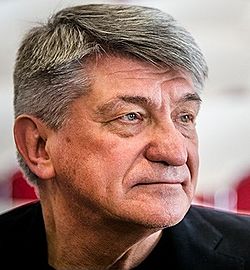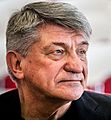Alexander Sokurov facts for kids
Quick facts for kids
Alexander Sokurov
|
|
|---|---|
| Александр Сокуров | |

Sokurov in 2016
|
|
| Born | 14 June 1951 Podorvikha, Irkutsky District, Soviet Union
|
| Alma mater | Nizhny Novgorod University Gerasimov Institute of Cinematography |
| Occupation | Film director |
| Years active | 1978–present |
| Title | People's Artist of Russia (2004) |
| Awards |
|
Alexander Nikolayevich Sokurov (born June 14, 1951) is a famous Russian filmmaker. He is known for his unique movies and documentaries. He has received the title of People's Artist of Russia.
Some of his most important films include Russian Ark (2002), which was filmed in one continuous shot. Another major work is Faust (2011). This film won the Golden Lion, which is the top award at the Venice Film Festival.
Contents
Early Life and Film Career
Alexander Sokurov was born in Podorvikha, a place in Siberia, Russia. His father was a military officer. He studied history at Nizhny Novgorod University and graduated in 1974.
The next year, he started studying at the Gerasimov Institute of Cinematography, a famous film school. There, he became friends with another well-known director, Andrei Tarkovsky. Tarkovsky's film Mirror greatly influenced Sokurov.
Early Films and Challenges
Many of Sokurov's early movies were not allowed to be shown by the Soviet government. Despite this, he made many documentaries during this time. These included The Dialogues with Solzhenitsyn and a film about director Grigori Kozintsev's apartment.
His film Mournful Unconcern was nominated for a major award, the Golden Bear, at the 37th Berlin International Film Festival in 1987.
Gaining International Recognition
Sokurov's film Mother and Son (1997) was his first movie to become famous around the world. It won a special award at the 20th Moscow International Film Festival.
He later made a related film called Father and Son (2003). A famous writer, Susan Sontag, said that two of Sokurov's films were among her top ten favorite movies from the 1990s. She greatly admired his work. In 2006, he received the Master of Cinema Award.
Sokurov's films have often been shown at the Cannes Film Festival. However, he did not win top awards at major international festivals until 2011. His film Russian Ark (2002) was very successful. People praised it for its amazing visuals and for being filmed in one long, continuous shot.
Exploring Power in Film
Sokurov has created a series of four films that look at how power can change people. This series is called a tetralogy.
- The first film was Moloch (1999), about Adolf Hitler.
- The second was Taurus (2001), about Vladimir Lenin.
- The third was The Sun (2005), about Hirohito.
In 2011, Sokurov finished the series with Faust. This film is a new version of the classic story by Goethe. It shows a character named Faust who is driven by a strong desire for power. Faust won the Golden Lion at the 68th Venice International Film Festival.
Films About Military Life
Sokurov is very interested in the military world of the former USSR. This is partly because of his own family connections. He has made several films about military life.
- Spiritual Voices: From the Diaries of a War
- Confession: From the Commander’s Diary
- Soldier’s Dream
Spiritual Voices: A War Diary
In 1994, Sokurov traveled with Russian soldiers to a border post between Tajikistan and Afghanistan. This trip resulted in Spiritual Voices: From the Diaries of a War. This very long film (327 minutes) is a deep look at war and the spirit of the Russian army.
The film uses beautiful Landscape photography. Music by composers like Mozart and Beethoven is also very important. The sounds of animals, sighs, and other noises, combined with visual effects like fog, make the film feel dreamlike. It shows Sokurov's style: long shots, special filming methods, and a mix of real-life and fictional elements.
The film shows the fear on the faces of young soldiers. Sokurov captures their hard work and sadness. He also shows their daily routines, like eating, sharing tobacco, writing letters, and cleaning. The film does not have a typical story with a clear beginning and end. It focuses on the endless waiting and fear at the border.
Confession: A Commander's Story
In Confession: From the Commander’s Diary, Sokurov filmed officers in the Russian Navy. He showed their routine and how little freedom they had. The film lets us hear the thoughts of a Ship Commander.
Sokurov and his team went on a naval patrol ship to a base in the Arctic waters. They filmed the sailors doing their daily activities in the small space of the ship.
Soldier's Dream
Soldier's Dream is another film by Sokurov about military themes. It has no talking. This film was made from parts of Spiritual Voices. It was shown at a film festival in Germany in 1995.
Studio and Teaching
In 2010, Alexander Sokurov started teaching his own film course at the Kabardino-Balkarian State University in Nalchik. In 2015, 12 students finished his course. Some of these students, like Kantemir Balagov and Kira Kovalenko, have become successful filmmakers themselves.
Political Views
Alexander Sokurov has sometimes spoken out about political issues. In December 2016, he asked President Vladimir Putin to rethink a decision about another filmmaker, Oleg Sentsov. Putin did not change the decision.
In 2022, Sokurov criticized the Russian government and spoke against the conflict in Ukraine. Because of this, he was not allowed to leave Russia in June 2022.
Sokurov's film Fairytale was not allowed to be shown in Russia. No clear reason was given. Sokurov said that censorship is not allowed in Russia and that people should be able to see works of art. He pointed out that his movie had already been shown all over the world.
Filmography
Feature Films
| Year | English Title | Original Title | Credited as | Notes | |
|---|---|---|---|---|---|
| Director | Writer | ||||
| 1987 | Mournful Unconcern | Скорбное бесчувствие | Yes | No | produced in 1983 |
| 1987 | The Lonely Voice of Man | Одинокий голос человека | Yes | Yes | produced in 1979 |
| 1988 | Days of Eclipse | Дни затмения | Yes | No | |
| 1989 | Save and Protect | Spasi i sokhrani | Yes | No | |
| 1990 | The Second Circle | Круг второй | Yes | No | |
| 1992 | The Stone | Yes | No | ||
| 1994 | Whispering Pages | Тихие страницы | Yes | Yes | |
| 1997 | Mother and Son | Мать и сын | Yes | No | |
| 1999 | Moloch | Молох | Yes | No | |
| 2001 | Taurus | Телец | Yes | No | also cinematographer |
| 2002 | Russian Ark | Русский ковчег | Yes | Yes | |
| 2003 | Father and Son | Отец и сын | Yes | No | |
| 2005 | The Sun | Сóлнце | Yes | No | also cinematographer |
| 2007 | Alexandra | Александра | Yes | Yes | |
| 2011 | Faust | Фауст | Yes | Yes | Golden Lion winner |
| 2022 | Fairytale | Сказка | Yes | Yes | |
Documentaries
| Year | Title | Notes |
|---|---|---|
| 1981 | Sonata for Viola. Dmitri Shostakovitch | |
| 1986 | Elegy | |
| 1987 | And Nothing More | |
| Evening Sacrifice | ||
| Patience of Labour | ||
| 1988 | Maria (Peasant Elegy) | |
| Moscow Elegy | ||
| 1989 | Sonata for Hitler | |
| Soviet Elegy | ||
| 1990 | Petersburg Elegy | |
| To The Events In Transcaucasia | ||
| A Simple Elegy | ||
| A Retrospection of Leningrad (1957–1990) | ||
| 1991 | An Example of Intonation | |
| 1992 | Elegy from Russia | |
| 1995 | Soldier's Dream | |
| Spiritual Voices | ||
| 1996 | Oriental Elegy | |
| 1997 | Hubert Robert. A Fortunate Life | |
| A Humble Life | ||
| The St. Petersburg Diary: Inauguration of a monument to Dostoevsky | ||
| 1998 | The St. Petersburg Diary: Kosintsev's Flat | |
| Confession | ||
| The Dialogues with Solzhenitsyn | ||
| 1999 | dolce… | |
| 2001 | Elegy of a Voyage | |
| 2004 | The St. Petersburg Diary: Mozart. Requiem | |
| 2006 | Elegy of a life: Rostropovich, Vishnevskaya | |
| 2015 | Francofonia | |
| 2025 | Director's Diary | Post-production |
Short Films
- The Degraded (Разжалованный, 1980)
- Empire (Ампир, 1986)
Awards and Recognition
Alexander Sokurov has won many awards for his films:
- Locarno International Film Festival, Bronze Leopard (The Lonely Voice of Man, 1987)
- Moscow International Film Festival, FIPRESCI Award (The Lonely Voice of Man, 1987)
- Berlin International Film Festival, Award of the Forum special programme (Days of Eclipse, 1989)
- International Film Festival Rotterdam, FIPRESCI Award, KNF Award (Elegy, A Simple Elegy, 1991)
- State Prize of the Russian Federation (Mother and Son, 1997)
- State Prize of the Russian Federation (Moloch, Taurus, 2001)
- Russian Guild of Film Critics Prize for Best Director (Taurus, 2001)
- Nika Award for Best Director and Best Picture (Taurus, 2001)
- Toronto International Film Festival, IFC Vision Award (Russian Ark, 2002)
- São Paulo International Film Festival, Special Award for Lifetime Achievements (2002)
- Cannes Film Festival, FIPRESCI Award (Father and Son, 2003)
- Argentine Film Critics Association, The Silver Condor Award (Russian Ark, 2004)
- Yerevan International Film Festival, Golden Apricot for Best Picture (The Sun, 2005)
- Locarno International Film Festival, Leopard of Honour for Lifetime Achievements (2006)
- Venice Film Festival, Robert Bresson Award for spiritual search and promotion of human culture (2007)
- Venice Film Festival, Golden Lion for Best Picture (Faust, 2011)
- FEST, Belgrade Winner Award for his lifetime contribution to the art of film (2015)
- International Film Festival of Kerala, Lifetime Achievement Award for his lifetime contribution to world cinema (2017)
Images for kids
See also
 In Spanish: Aleksandr Sokúrov para niños
In Spanish: Aleksandr Sokúrov para niños
 | Janet Taylor Pickett |
 | Synthia Saint James |
 | Howardena Pindell |
 | Faith Ringgold |


